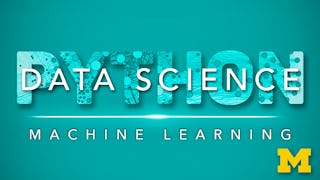Filter by
SubjectRequired
LanguageRequired
The language used throughout the course, in both instruction and assessments.
Learning ProductRequired
LevelRequired
DurationRequired
SkillsRequired
SubtitlesRequired
EducatorRequired
Explore the Algorithm Python Course Catalog

University of Michigan
Skills you'll gain: Pandas (Python Package), Jupyter, NumPy, Data Manipulation, Data Science, Data Structures, Data Analysis, Statistical Analysis, Pivot Tables And Charts, Data Cleansing, Data Import/Export, Probability & Statistics, Python Programming, Programming Principles

Skills you'll gain: SQL, Databases, Stored Procedure, Relational Databases, Database Design, Query Languages, Database Management, Data Analysis, Jupyter, Data Manipulation, Pandas (Python Package), Transaction Processing

Skills you'll gain: Generative AI, Prompt Engineering, Large Language Modeling, Software Development Life Cycle, Unit Testing, ChatGPT, HTML and CSS, Development Environment, Web Design and Development, Jupyter, Hypertext Markup Language (HTML), Software Engineering, Artificial Intelligence, Cascading Style Sheets (CSS), Software Development Tools, Web Development, Application Deployment, Automation, Interviewing Skills, Professional Networking
 Status: New
Status: NewSkills you'll gain: Django (Web Framework), Responsive Web Design, HTML and CSS, Relational Databases, Object Oriented Programming (OOP), Database Management Systems, Bootstrap (Front-End Framework), SQL, Database Design, Databases, Front-End Web Development, Unit Testing, MySQL, Debugging, User Interface (UI), Web Development, Web Servers, Test Driven Development (TDD), Web Applications, Programming Principles

University of Michigan
Skills you'll gain: Feature Engineering, Applied Machine Learning, Supervised Learning, Scikit Learn (Machine Learning Library), Predictive Modeling, Machine Learning, Decision Tree Learning, Unsupervised Learning, Dimensionality Reduction, Random Forest Algorithm

Skills you'll gain: Debugging, Python Programming, Cybersecurity, Cyber Security Assessment, Scripting, Programming Principles, Algorithms, Automation, Integrated Development Environments, File Management, Data Structures

Skills you'll gain: Django (Web Framework), Full-Stack Web Development, Version Control, Restful API, Data Structures, Unix Commands, Bootstrap (Front-End Framework), Git (Version Control System), Back-End Web Development, GitHub, Web Design and Development, Relational Databases, Front-End Web Development, Object Oriented Programming (OOP), Database Management Systems, SQL, Database Design, Unit Testing, Algorithms, Web Development
 Status: New
Status: NewVanderbilt University
Skills you'll gain: Prompt Engineering, ChatGPT, Generative AI Agents, Generative AI, OpenAI, Ideation, Verification And Validation, Data Validation, Data Presentation, Productivity, AI Personalization, Document Management, Python Programming, Agentic systems, Artificial Intelligence and Machine Learning (AI/ML), Artificial Intelligence, Personalized Service, Large Language Modeling, Risk Management Framework, Expense Management
 Status: New
Status: NewMicrosoft
Skills you'll gain: Version Control, GitHub, Debugging, Git (Version Control System), Unit Testing, Data Structures, Python Programming, Software Testing, Development Testing, Scripting, Computer Programming, Web Development, Algorithms, Program Development, Scripting Languages, Integrated Development Environments, Object Oriented Programming (OOP)
 Status: New
Status: NewVanderbilt University
Skills you'll gain: Prompt Engineering, ChatGPT, Generative AI Agents, OpenAI, Productivity, Python Programming, Agentic systems, Artificial Intelligence and Machine Learning (AI/ML), Generative AI, Artificial Intelligence, Large Language Modeling, Creative Thinking, Ingenuity, Brainstorming, Software Development Tools, Application Development, Prototyping, Persona (User Experience), Business Logic, Automation

Skills you'll gain: Exploratory Data Analysis, Data Storytelling, Statistical Hypothesis Testing, Data Ethics, Data Presentation, Data Visualization Software, Sampling (Statistics), Regression Analysis, Feature Engineering, Data Transformation, Descriptive Statistics, Data Visualization, Tableau Software, Data Manipulation, Statistical Analysis, Probability Distribution, Statistical Methods, Applied Machine Learning, Object Oriented Programming (OOP), Data Analysis

University of Pennsylvania
Skills you'll gain: Data Structures, Programming Principles, Python Programming, Computer Programming, Computational Thinking, Scripting, Software Development Tools, Integrated Development Environments, Data Import/Export, Jupyter, File Management
Algorithm Python learners also search
In summary, here are 10 of our most popular algorithm python courses
- Introduction to Data Science in Python: University of Michigan
- Databases and SQL for Data Science with Python: IBM
- IBM AI Developer: IBM
- Meta Web Development Fundamentals: Meta
- Applied Machine Learning in Python: University of Michigan
- Automate Cybersecurity Tasks with Python: Google
- Meta Back-End Developer: Meta
- AI Agent Developer: Vanderbilt University
- Python Programming Fundamentals: Microsoft
- AI Agents and Agentic AI in Python: Powered by Generative AI: Vanderbilt University










